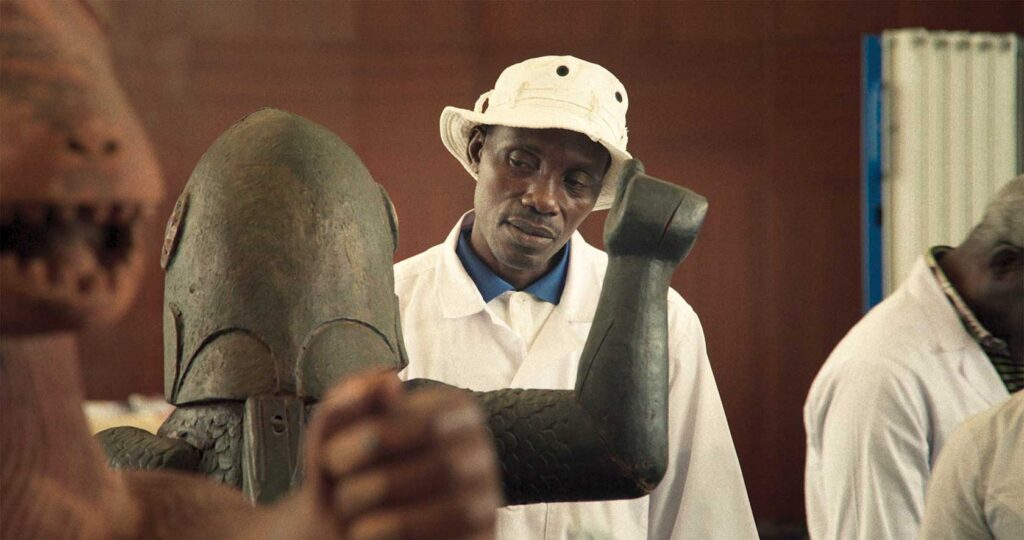‘Dahomey’ follows the repatriation of artworks from France to West Africa

Banner Arts & Culture Sponsored by Cruz Companies
For years, art museums and their critics have discussed repatriation. In the art world, repatriation is the act of returning controversially acquired artifacts to their home countries. “Controversially acquired” is really a euphemism for stolen and looted art typically acquired during times of conflict like war and colonization.
French-Senegalese writer and director Mati Diop (“Atlantics”), documents the repatriation process of 26 royal treasures originally from the Kingdom of Dahomey. Temporarily housed in Paris’ Quai Branly Museum, she films their journey from France to Cotonou, Benin, in West Africa in her self-described fantasy-documentary, “Dahomey.”
“Dahomey” follows the transport of 26 statues across the Atlantic Ocean over two years, from 2021 to 2023. The hour-long documentary delicately captures the packaging and shipment of the statues in Paris, their arrival in Benin and the tension that follows housing objects in a country that has modernized without them. Diop records a passionate conversation among students at the University of Abomey-Calavi about the relevance and purpose of repatriation. They discuss the importance of material culture, memory and if there’s room in modern-day Cotonou to acknowledge and embrace the past.
In 2017, French President Emmanuel Macron made an announcement in Ouagadougou, Burkina Faso, about repatriating African artifacts from France to their countries of origin. In an English translation of a speech provided by Macron’s office, he announced, “I cannot accept that a large share of several African countries’ cultural heritage be kept in France. There are historical explanations for it, but there is no valid, lasting and unconditional justification.” He added, “Within five years I want the conditions to exist for temporary or permanent returns of African heritage to Africa.”
For the fantasy aspect of the film, Diop gives a literal voice to the treasures in the documentary. Working with Haitian author Makenzy Orcel, Diop vocalizes the inner dialogue of the treasures using voice-overs in Fon, the language of the largest ethnic group in Benin. She articulates what it’s like to be stolen from one’s homeland; what it’s like to adjust to a new home in the West; and what it’s like to return to a land that used to feel like home but doesn’t anymore.
When discussing the possibility of repatriating African artifacts in her lifetime Diop said, “I sadly realized that I had never imagined the possibility of something like that happening in my lifetime, perhaps out of resignation. I had never imagined what restitution might actually look like, and while trying to visualize it, a film was already crystallizing in my mind.”
On the surface the film’s focus is on the restoration, restitution and repatriation of stolen objects. It is also an exploration of the experiences and the psychology of people caught between two worlds—Western Africa and France. The treasures were made in the image of Dahomey’s deities, rooted in ancient tradition. Now, the treasures are unsettled and working through their own realities of the modern-day exchange between Benin and France. The statues and the Beninise are processing restitution together as museum-goers engage with the art and while remembering their past and embracing their present.
In this genre-bending film, art imitates life.
“Dahomey” is the winner of the 2024 Golden Bear from the Berlin International Film Festival. It is screening at the Museum of Fine Arts, Boston on December 1.







